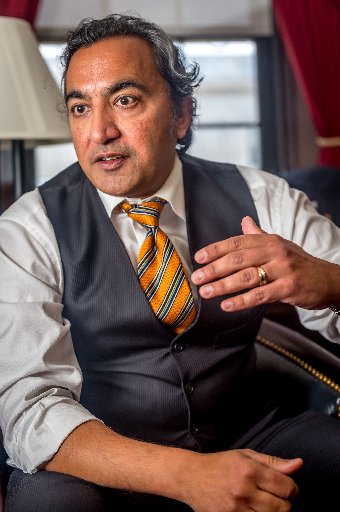Weeks Into Second Term, U.S. Congressman Bera Plans India Trip with Obama to Meet PM Modi
South Asian minorities protest: “Ami Bera represents Narendra Modi, the Butcher of Gujarat”
SACRAMENTO, CA: Jan. 21, 2015 – Just two weeks after being sworn into the U.S. House of Representatives for a sophomore term, U.S. Congressman Ami Bera announced plans to travel to India with President Obama to meet controversial Indian Prime Minister Narendra Modi in spite of a contentious reelection campaign focused on Bera’s dismissal of human rights issues in India and intimacy with the genocide-accused premier.
The trip, scheduled to coincide with India’s 65th Republic Day celebrations, is Bera’s second. A local news outlet reports: “Bera made his first official visit to India in 2013, during which he helped broker some cooperative deals between the Confederation of Indian Industry and UC-Davis. But his support of Modi – a controversial figure whom opponents say has oppressed Muslims, Sikhs and Christians – caused some Indian-Americans to oppose his re-election bid last year and stage protests in cities including Rancho Cordova and Davis.”

Rep. Bera greets PM Modi upon his arrival in New York City on September 28, 2014.
Sentiments towards Bera, an Elk Grove resident who is the only Indian-American in U.S. Congress, still run strongly negative among South Asian minorities in the Northern California region. For instance, Bhajan Singh, a participant in the protests, thinks: “Ami Bera represents Narendra Modi, the Butcher of Gujarat, who is the most anti-American politician imaginable.” Singh says he spoke with Bera’s office in January 2014 about Modi’s human rights record after previous personal appeals to the representative.
Bera’s reelection was protested by South Asian minorities through a variety of means for nearly three months before the November 4, 2014 poll. The American-Sikh PAC, a political group, took the lead in disavowing Bera after he refused to recognize Indian State participation in the 1984 Sikh Genocide even after several other area congressional representatives acknowledged that the ruling party of India sponsored the genocide, a position shared by Amnesty International and Human Rights Watch. Activism expanded in October when a prominent Sikh political figure, Harmeet K. Dhillon, led a precinct walk in Bera’s district, stating: “Bera is a holocaust denier.”
In late October, Bera’s links to Modi came under question during protests outside his district office and at his campaign events. Activists like Mohan Ram Paul distributed flyers and held signs claiming: “Ami Bera sides with oppressors.” Paul now remarks, “With help from a politician like Bera, the Indian State’s operating model of state-sponsored genocides, pogroms, discrimination, extrajudicial killings, and torture will thrive.”

Protesters outside Rep. Bera’s district office oppose his reelection on October 28, 2014.
Bera’s links to Modi trace to his official advocacy for the Indian Prime Minister. In July, he agitated for Modi to be invited to address a Joint Session of Congress; in September, he joined Modi on stage during the premier’s inaugural visit to the United States. Regarding his participation in the September 28 event hosted at Madison Square Garden in New York City, Bera said: “I thank Mr. Modi for his inspirational words and for the vision he laid out today. I look forward to continuing to work together.”
Modi was Chief Minister of the Indian State of Gujarat from 2001 to 2014, while Bera was born in Los Angeles after his parents immigrated from Gujarat in 1958. Although one of the worst controversies haunting Modi’s political career is the 2002 Gujarat Genocide, the congressman refuses to discuss the massacre. Yet Modi is directly implicated, as a U.S. State Department commission reported:
“In response to a fire set by Muslims, Hindu mobs killed 1,200-2,500 Muslims, forced 100,000 people to flee, and destroyed homes. Christians were also killed and injured, and many churches were destroyed. India’s National Human Rights Commission found evidence of premeditated killing by members of Hindu nationalist groups, complicity by state government officials, and police inaction.”
After a decade of probing Modi’s involvement, a Special Investigation Team (SIT) from India’s Supreme Court recommended not filing charges against the politician. Many Modi supporters interpret this as an exoneration. However, Supreme Court Senior Advocate Raju Ramachandran, appointed as amicus curiae to impartially analyze the SIT’s findings, said based on its report: “Modi should be prosecuted for serious criminal offences such as promoting religious enmity, doing acts prejudicial to national integration and maintenance of harmony and deliberately and wantonly disobeying the law with intent to cause injury.”
Meanwhile, Modi’s Bharatiya Janata Party (BJP) hopes to introduce a national law banning free religious conversion. Just last month, Amit Shah, BJP president and PM Modi’s closest advisor, said: “The government is ready to bring in a law against forced conversions.” Six Indian states already have such laws, including Gujarat, which passed anti-conversion legislation in 2003 under then-Chief Minister Modi. The law bans “forced conversions,” but defines force as including any mention by a religious teacher of “divine displeasure.”
“If consistently enforced, these laws criminalize Christianity, Judaism, and Islam,” says Bhajan Singh. “Modi wants to make this a national law, but Bera is only interested in pursuing a financial relationship with the Indian government that benefits no one except multinational corporations and big business in general. Since he will turn a blind eye to anything to curry Modi’s favor, and families and small businesses may well suffer economically and socially for it, we hope minorities in India will protest Bera’s arrival.”
Bera, a Foreign Affairs Committee member, also belongs to the American Sikh Congressional Caucus, which South Asia expert Pieter Friedrich alleges tilts pro-Modi, saying: “The caucus explicitly agreed as a condition of its formation to ignore international issues like the 1984 Sikh Genocide even though it remains the most significant event of Sikh history in living memory.”

